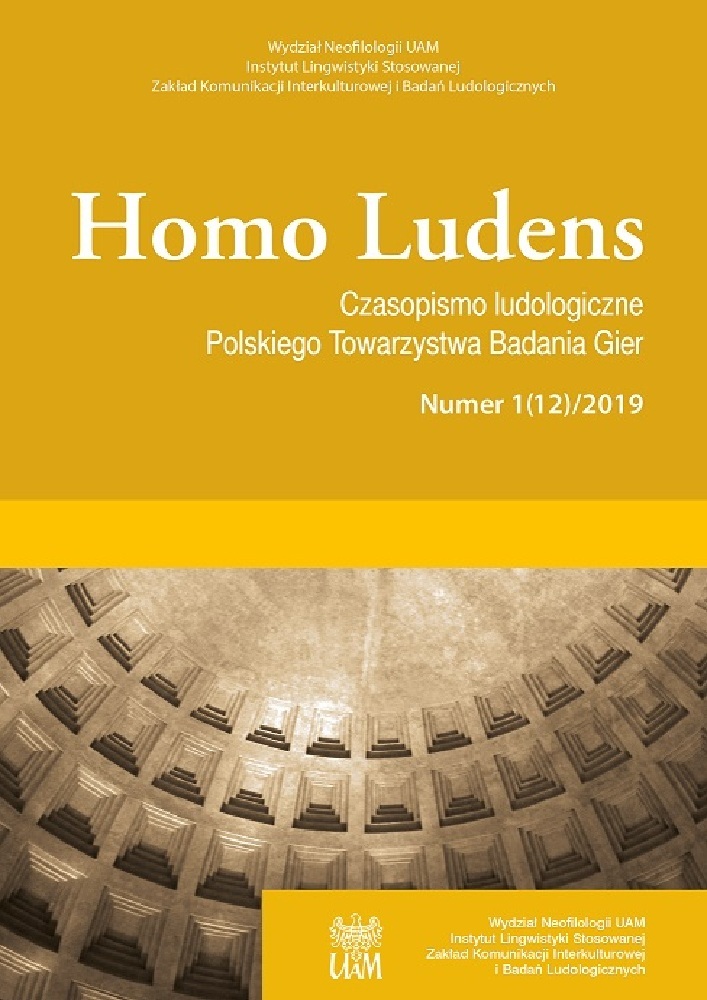Abstrakt
Gotyk, jako gatunek literacki, wciąga swoich graczy w grę, wywołując w nich ten sam niepokój, który często odczuwają jego bohaterowie. Ponadto nierzadko ważny jego element stanowi transgresywność, przejawiająca się chociażby w elementach nadprzyrodzonych. Na szczególną uwagę zasługują tutaj duchy, wywołujące uczucie niesamowitości spowodowane przez spotkanie znanego z tym, co obce. Na element ten często trafić można w grach wideo. W artykule przyjrzę się grze Oxenfree (2016), wskazując na jej gotyckie elementy oraz ukazując, w jaki sposób niesamowitość przejawia się poprzez audiowizualny glitch.
Bibliografia
Aarseth, E. (2014). I Fought the Law: Transgressive Play and the Implied Player. In N. Segal & D. Koleva (Eds.), From Literature to Cultural Literacy (pp. 180–188). London: Palgrave Macmillan UK.
Baelo Allué, S. (2003). Blurring Posthuman Identities: The New Version of Humanity Offered by Bicentennial Man. ODISEA. Revista de Estudios Ingleses, 4, 17–30.
Betancourt, M. (2017). Glitch Art in Theory and Practice: Critical Failures and Post-Digital Aesthetics. New York: Routledge.
Chess, S. (2015). Uncanny Gaming. Feminist Media Studies, 15(3), 382–396.
Edwards, J. D. (2017). Contemporary American Gothic. In J. A. Weinstock (Ed.), The Cambridge Companion to American Gothic (pp. 71–84). Cambridge, United Kingdom; New York, NY: Cambridge University Press.
Elliot, A. J., & Devine, P. G. (1994). On the Motivational Nature of Cognitive Dissonance: Dissonance As Psychological Discomfort. Journal of Personality and Social Psychology, 67(3), 382–394.
Festinger, L. (1962). Cognitive Dissonance. Scientific American, 207(4), 93–106.
Freud, S., Strachey, J., Cixous, H., & Dennomé, R. (1976). Fiction and Its Phantoms: A Reading of Freud’s Das Unheimliche (The “uncanny”). New Literary History, 7(3), 525–645.
Hayles, N. K. (1999b). How We Became Posthuman: Virtual Bodies in Cybernetics, Literature, and Informatics. Chicago, Ill: University of Chicago Press.
Hester, Blake (2016, 9 June). The Oxenfree Alternate Reality Game You Probably Didn’t Know About. Retrieved from <https://killscreen.com/articles/oxenfree-alternate-reality-game-probably-didnt-know/>.
Hollington, S., & Kyprianou, K. (2007). Technology and the Uncanny, 17.1–17.10.
Holmes, E. G. (2010). Strange Reality: On Glitches and Uncanny Play. Eludamos. Journal for Computer Game Culture, 4(2), 255–276.
Jentsch, E. (1997). On the Psychology of the Uncanny (1906). Angelaki, 2(1), 7–16.
Jørgensen, K. & Faltin Karlsen. (2018). Introduction. In Transgressions In Games and Play (pp. 1–9). Cambridge, London: The MIT Press.
Oshii, M. (1995). Ghost In The Shell: Movie. Palm Pictures.
Pӧtzsch, H. (2018). Forms and Practices of Transgressivity in Videogames. In Transgressions In Games and Play (pp. 46–62). Cambridge, London: The MIT Press.
Proulx, T., Heine, S. J., & Vohs, K. D. (2010). When Is the Unfamiliar the Uncanny? Meaning Affirmation After Exposure to Absurdist Literature, Humor, and Art. Personality and Social Psychology Bulletin, 36(6), 817–829.
Punter, D. (2007). The uncanny. In C. Spooner & E. McEvoy (Eds.), The Routledge Companion to Gothic (pp. 129–136). London – New York: Routledge.
Ruberg, B. (2015). No Fun: The Queer Potential of Video Games that Annoy, Anger, Disappoint, Sadden, and Hurt. QED: A Journal in GLBTQ Worldmaking, 2(2), 108–124.
Smith, T., Obrist, M., & Wright, P. (2013). Live-streaming Changes the (Video) Game. In Proceedings of the 11th European Conference on Interactive TV and Video (pp. 131–138). New York, NY, USA: ACM.
Spooner, C., & McEvoy, E. (Eds.). (2007). The Routledge Companion to Gothic. London – New York: Routledge.
Sundén, J. (2013). A Queer Eye on Transgressive Play. In J. Sundén & M. Sveningsson, Gender and Sexuality in Online Game Cultures: Passionate Play (pp. 171–190). New York: Routledge.
Therrien, C. (2009). Games of Fear: A Multi-Faceted Historical Account of the Horror Genre in Video Games. In: B. Perron (ed.), Horror Video Games: Essays on the Fusion of Fear and Play (pp. 26–45). Jefferson, N.C.: McFarland.
Wachowski, L., & Wachowski, L. (1999). The Matrix. Warner Home Video.
Ludography
Call of Cthulhu [Computer software]. (2018). Nanterre: Cyanide.
Oxenfree [PlayStation 4 software]. (2016). Glandale: Night School Studio.
Toby Fox (2015). Undertale [Computer software]. Boston: Toby Fox.
Vampyr [Computer software]. (2018). Paris: Dontnod Entertainment.
Wreden, Davey (2013). The Stanley Parable [Computer software]. Galactic Cafe.
